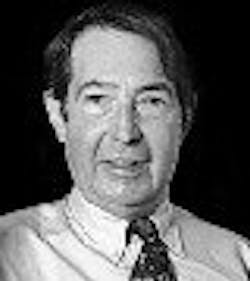Advanced process control in practice
ADVANCED process control is a concept that keeps evolving, always seeming just out of reach. In the beginning (early 1960s for me), it meant model-based process optimization under closed-loop regulatory control. This was something never realized in practice and seldom even attempted. I should be careful in using the word “never” because someone will surely come forward with an exception, perhaps several someones. In the 1960s, NASA was performing wonders with real-time programming and remote control that left industrial practitioners awe-struck with envy.
Two books published in 2004 by ISA and a new tool announced in the Fall of 2005 are heralding the advent of advanced process control as a standard tool for practicing engineers. The authors of these advances are all inductees in CONTROL magazine’s Process Automation Hall of Fame in addition to their distinguished industrial and business careers.
Harold Wade’s Basic and Advanced Regulatory Control, 2nd Edition should find a place in every process engineering library. This volume is a thorough treatment of process control technology from basic PID through a gamut of more sophisticated methods such as multivariable model predictive control. I’ve known Harold since his days with Biles & Associates more than 25 years ago (see "The Process Software Alchemists,” Around the Loop, CONTROL, Feb. ’97, p. 90). Biles was the software contractor for a DCS system under development at Esterline Angus and McMahon Technology Associates, and had been retained to assess its market prospects.
In addition to being an accomplished industrial controls developer/implementer, Wade has written extensively in the trade press, taught extensively in professional society and company-sponsored seminars, and designed PC ControLAB, an important process control training program. This book includes detailed discussions of controller tuning and self-tuning methods, cascade control, ratio control, feed-forward control and a host of specialized methods (split-range, cross-limiting, floating, time-proportioning and others).
Throughout his book, Wade’s emphasis is on practical understanding of the concept rather than mathematical rigor in its derivation. This is not to imply that that his presentation is simplistic. The subject matter is complex and the mathematical tools must match this complexity. The objective, nonetheless, is to impart useful knowledge that can be applied by working professionals.
Models Unleashed by Gregory K. McMillan and Robert A. Cameron is a successor to Advanced Control Unleashed published in 2003, and to Good Tuning published in 2001. All three are pocket-sized books that focused on working professionals by providing real-world operating problems to solve. In “Appendix D—Modern Myths” in Models Unleashed, the first topic is: “You need an advanced degree to do advanced control.” The authors then proceed to demolish this myth.
Greg McMillan is currently on the faculty at Washington University in St. Louis and is a consultant through EDP Contract Services (Austin, Tex.). During his 33-year career with Monsanto and Solutia, he practiced process control in all of its many guises, and retired as an ISA senior fellow. McMillan also was recognized as 1994 Engineer of the Year by CONTROL and is a regular columnist with this publication. Robert Cameron was a close associate at Monsanto/Solutia, and has more than 18 years of high-level experience in control system programming and advanced control implementation.
Models Unleashed covers simulation models, model identification, model setup and model tuning. Its “Appendix E” is an excerpt from McMillan and Stan Weiner’s, PE, “Here Comes the Sludge,” Control Talk, CONTROL, April ’03, p. 73.
Finally, Cutler Technology Corp. announced Adaptive Dynamic Matrix Control (ADMC) for multivariable control on Oct. 1, 2005. A major advantage claimed for ADMC is its elimination of PID controllers from the control hierarchy. PID controller dynamics are removed, on-line identification of the process is facilitated, and deterioration of multivariable PID controllers with time is eliminated. ADMC’s fundamental control algorithm is the field-proven DMC.
Charles R. Cutler developed and refined the DMC concept at Shell (Houston, Tex.), where he also was a colleague of Bill Biles. In 1984, Cutler organized DMCC as an independent software company. DMCC was acquired by Aspen Technology in the mid 1990s. Cutler Technology was organized in 1999 to advance DMC technology in cooperation with AspenTech.
You really can’t go wrong by listening to Wade, McMillan and Cutler (in no particular order). All are eager to communicate the technology of advanced process control. More importantly, all are eager to have you translate this understanding into tangible applications.
| About the Author |


